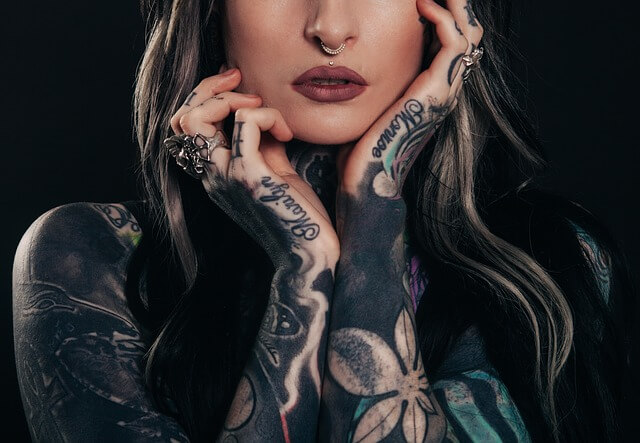Body Art And IP Laws

________________________________________________________________________________
This Blog is written by Prachika Modi from KIIT School of Law, Odisha. Edited by O.S.S.Sarada Rasagnya.
________________________________________________________________________________
INTRODUCTION
Progression in innovation has prompted an extraordinary change in the human way of life. This has urged individuals to explore and try new things either due to need or as a fashion statement. Body art is becoming increasingly popular these days. It is a form of an emotion that is incredibly personal to the person getting inked. These days’ people at least have one tattoo on their bodies. Nowadays tattoos have become a medium of expression. Tattoo making is an art and what is drawn is art too.
The world’s consideration was first attracted to the copyrightability of tattoos when Victor Whit mill, the artisan behind Mike Tyson’s face tattoo, sued Warner Bros for an imitative tattoo worn by an entertainer in Hangover II. From that point forward, I find that there has been a furious conversation with respect to tattoo specialists’ copyright over their tattoos, including issues like an obsession, possession, and reasonable use. The Indian laws talk about copyright over artistic work, but are tattoos considered artistic enough to have their own copyright?[1] People look through various designs as a type of motivation before getting their bodies permanently inked. However, who owns this kind of art? Is there any infringement of copyright on the artwork when someone else takes inspiration? Who has the right to ownership?
PROVISIONS
Indian law does not explicitly specify that there is any requirement for a tangible medium of expression. There is nothing in the Indian Copyright Act, 1957, or any international convention that expresses that tattoos are to be explicitly eliminated from the Copyright Act.
Section 2(c) of the Indian Copyright Act states that “artistic work means a painting, a sculpture, a drawing (including a diagram, map, chart or plan), an engraving or a photograph, whether or not any such work possesses artistic quality.”[2]
In the same context, tattoos are a form of artistic work. Body art is a form of drawing or painting which is engraved onto a human body. In this way, tattoos too are considered as artwork and hence can be copyrightable.
1. Ownership
Normally, the person getting a tattoo is the copyright proprietor according to Section 17 of the Indian copyright Act, given that a tattoo procedure would be one that is funded. This, in any case, is dependent upon consent despite what might be expected, and it isn’t difficult to accept that the tattoo artist that is all the more settled, in explicit, would be informed to keep up their work of art’s copyright ownership. Before getting a body, art there should be a waiver of sorts given determining that the copyright of the tattoo belongs to the tattoo artist.
If the client chooses from a specific tattoo from the current work of the artist, there would be no issue regarding copyright since the tattoo artist would hold the copyright over that specific piece of work.
Having art of the body, and intellectual property that another person holds, and also has the right to control raises the issue about how this “right of control” could be exercised.
2. Rights
The Copyright Office is the guardian for the protection of artworks in India.[3] For all such protection, innovation is the key fixing without which copyright protection doesn’t exist. Making a tattoo that is different includes creators’ hard work and intellect. Subsequently, it must be noticed that ownership of such rights lies in the hand of the artist. Consequently, an artisan has the exclusive rights to adventure such work until and unless if he/she allows somebody to permit to do likewise.
Section 14 of the Indian Copyright Act defines rights stated in the act. If we read Section 14(c)(ii) of the act, it states it is the duty of the artisans to “communicate the work to the public” which also includes tattoos. Considering that a tattoo would basically be on an individual, one can just envision how this right could be practiced by a copyright owner if the case might be so. It is not likely that any court would consider a copyright proprietor who says that the individual in question can choose with respect to how the work is communicated to the public since that would include the controlling of someone else and what he or she does just as his or her bodies, which would not be suitable. Due to the restrictions that would emerge when the tattoo artist has command over their rights, the artist will not have an option to practice his rights.
When looking at the transferability of these rights, there may emerge such a need to smother how copyright can be used in a body art would likewise fundamentally impact copyright transfers.
3. Assignor’s Rights
Section 19A of the Indian Copyright Act states: “If an assignee fails to make sufficient exercise of the rights assigned to him, and such failure is not attributable to any act or omission of the assignor, then, the Copyright Board may, on receipt of a complaint from the assignor and after holding such inquiry as it may deem necessary, revoke such assignment.” [4]
It is debatable that what might be an adequate exercise of the rights assigned to body art. Not demonstrating a painting as per artists’ pleasure isn’t an inadequate exercise of rights assigned.
4. Infringement
If the body art design was found to be infringed, the provisions of the Copyright Act related to infringing copies state confiscation of work will not be possible because infringing copy would be on a human body.
5. Moral Rights of Artist
An artist has their set of moral rights for the art they have worked on. Section 57 of the Indian Copyright Act states “To restrain or claim damages in respect of any distortion, mutilation, modification or other act in relation to the said work if such distortion, mutilation, modification or other act would be prejudicial to his honor or reputation.”[5] Something that has not been tried in court is whether an artists’ honesty would be termed as violated if the tattoo is removed.
6. Merchandise
Issues related to copyright law won’t be particularly significant on account of an impermanent or stick-on tattoo, it is proper to take note of that copyright law can’t assist with merchandise manufactured products dependent on copyrighted work in excess to a certain point. Section 15(2) of the Indian Copyright Act states “Copyright in any design, which is capable of being registered under Designs Act, 2000 but which has not been so registered, shall cease as soon as any article to which the design has been applied has been reproduced more than fifty times by an industrial process by the owner of the copyright or, with his license, by any other person.”[6]
Therefore, copyright is not applicable to all products unless merchandising is confines to extremely limited products.
CASE LAWS
There aren’t many cases related to copyright of body art as cases get settled behind the courts.
In 2011, the Indian Copyright Office approved copyright over a tattoo that was engraved on Bollywood star, Shah Rukh Khan. The tattoo includes a particular letter ‘D’ that is inked on his arm for the film ‘Don 2.’ The letter ‘D’ has been registered for copyright under the name of Shah Rukh Khan.
In 2005, Rasheed Wallace, an NBA player, was sued tattoo artist for projecting his tattoo that was on the right arm for Nike basketball shoe advertisement. Just like most cases this also got settled so there isn’t any proper judicial review.
In the case of S. Victor Whit mill v. Warner Bro or popularly known as the Hangover II case. In this case, an actor in the film, portrayed by Edward Helms, had a tattoo in his face that replicated the tattoo that was on the face, similarly to the boxer Mike Tyson. The tattoo artist for Mike Tyson’s face demanded to stop the screening on the grounds infringing his copyright. He stated that the filmmakers didn’t take his consent before using the tattoo on Edward’s face and therefore they were guilty of copyright infringement. Even though the case was settled behind the court, Judge Perry made some comments that he had a “powerful probability of deciding on the merits of copyright violation” and that most of the statements made by the Warner Bros were “just stupid.” Judge Perry said: “the tattoo itself and the design itself can be copyrighted, and I think it’s entirely consistent with the copyright law.”
This statement is important because it states that body art is copyrightable.
Is copyright protection for body art extends to design?
David Beckham has inked his wife Victoria’s name in Hindi; the question here arises that if tomorrow someone replicates this design on to a t-shirt or cap, can the tattoo artist restrain him from doing such on the grounds of infringing his copyright?
I figure this would rely on the specific tattoo being referred to and the ‘originality’ that one could credit to the design: It would be hard to contend that the tattoo artist possesses copyright over a name written in such a well-known language, with the goal that no one else may repeat it commercially without his consent.
Saif Ali Khan has tattooed his wife Kareena’s name. would the tattoo artist who inked this tattoo has the right to control the replication of the tattoo on the stake that it’s a unique design since it uses various scripts to combine the word ‘Kareena.’
ANALYSIS
The aforementioned discussion has tossed light on the copyright protection of tattoos. Prima Facie, it involves two people i.e.; the artist and the tattoo carrier. For the most times, these rights are enjoyed by anyone of them or now and then shared among one another. As of now, there has been no precedent of reference that will define the limit to the degree of injunctive help that might be looked sought by the copyright holders without violating the infringer’s rights.
However, it is high time for us to comprehend copyright protection for artists and tattoo carriers. Just like the painters, get protection for their painting or artists to get protection for their art through various laws enriched under copyright and related laws in a nation, similarly, copyright protection ought to be accessible for the artist and tattoo carriers too.
To protect and enforce these rights, we need a strong foundation that will recognize the magnitude of damage that copyright proprietors can seek without affecting the rights of the infringer. Since this is yet a moderately new concept and there are very few cases for there to be a set as a point of reference, there is still a significant amount of grey present. There is no proper interpretation, which can look upon. All cases are going merely on the basis of statutory provisions.
CONCLUSION
It is clear from Warner Bros. case verdict and Shahrukh Khan’s tattoo being granted copyright protection, that tattoos are indeed copyrightable. The variable in the condition, however, is the degree of the rights that are to be granted to the parties and its enforceability.
REFERENCES
[1] https://indjustice.com/the-law/2020/2/24/intellectual-property-rights-and-tattoos#:~:text=There%20is%20nothing%20in%20the,excluded%20from%20the%20Copyright%20Act.&text=The%20tattoo%20has%20been%20registered,name%20and%20has%20been%20copyrighted.
[2] https://copyright.gov.in/Documents/CopyrightRules1957.pdf
[3]http://ipassisto.com/tattoo-and-copyright-law-kishan-kumar-iiird-year-central-university-of-south-bihar-bihar/
[4] https://copyright.gov.in/Documents/CopyrightRules1957.pdf
[5] https://copyright.gov.in/Documents/CopyrightRules1957.pdf
[6] https://copyright.gov.in/Documents/CopyrightRules1957.pdf

